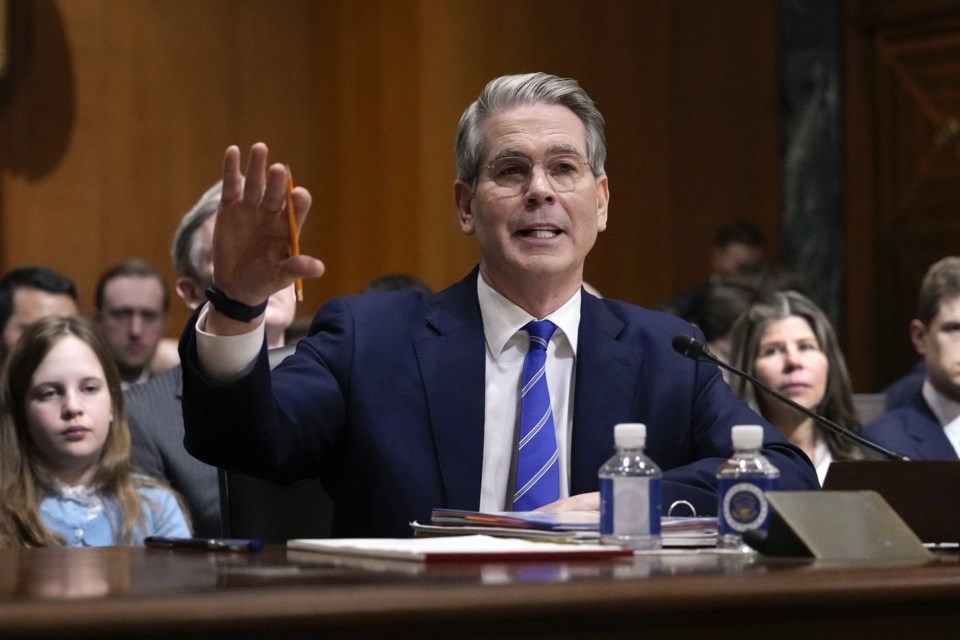WASHINGTON (AP) ŌĆö on Thursday faced sharp questions from both Democrats and Republicans on tax policy, tariffs, China, Russia sanctions and the future of an IRS tax filing system that Republicans have called to be cut.
And in turn, Bessent defended of 's economic policies and proposals.
Bessent sat in front of the Senate Finance Committee for his confirmation hearing, where he told lawmakers that the U.S. faces economic calamity if Congress does not renew provisions of Trump's Tax Cuts and Jobs Act. He also asserted the Federal Reserve should remain independent from the president's influence and U.S. sanctions on Russian oil should be more aggressive.
He was introduced by a fellow South Carolinian, Republican Sen. Lindsey Graham, who said the U.S. needs a treasury secretary ŌĆ£who knows what heŌĆÖs doing, has the trust of the president and loves his country.ŌĆØ Graham added: ŌĆ£Your ship came in with this guy.ŌĆØ
But Democrats, including Sens. Ron Wyden of Oregon and Michael Bennet of Colorado, expressed frustration that Trump's promise to extend provisions of his 2017 tax cuts and add to the that has surpassed $36 trillion.
Bennet assailed Bessent for shedding ŌĆ£crocodile tearsŌĆØ over the debt and spending, while the Tax Cuts and Jobs Act drove up the debt. ŌĆ£There's so many things I think you owe the American people after we have seen the catastrophe" from the tax cuts.
Bessent is a billionaire who, before becoming a Trump donor and adviser, donated to various Democratic causes in the early 2000s, notably Al GoreŌĆÖs presidential run. He also worked for George Soros, a major supporter of Democrats.
Republican Sen. Ron Johnson of Wisconsin also probed Bessent with questions about bringing national spending down to pre-pandemic levels.
In his testimony, Bessent committed to maintaining the ŌĆö which allows taxpayers to file their returns directly to the IRS for free ŌĆö at least for the 2025 tax season, which Republican lawmakers say the program is a waste of money because free filing programs already exist, although they are not popular.
He also called for stronger sanctions on Russia, saying the Biden administrationŌĆÖs sanctions regime isnŌĆÖt ŌĆ£muscularŌĆØ enough. ŌĆ£I believe the previous administration was worried about raising U.S. energy prices during an election season," he said.
Bessent was one of several people Trump considered for the position. Trump on Bessent as his nominee. He also mulled over billionaire investor John Paulson and Howard Lutnick, whom Trump tapped as his nominee for commerce secretary.
The treasury secretary is responsible for serving as the presidentŌĆÖs fiscal policy adviser and managing the public debt. He would also be a member of the presidentŌĆÖs National Economic Council.
If confirmed, Bessent will oversee massive agencies within the Treasury Department, including the Internal Revenue Service. The IRS received a massive boost in funding from DemocratsŌĆÖ Inflation Reduction Act, though that money has been in constant threat of being cut.
Trump expects him to help enable trillions of dollars in tax cuts, ensure , manage a ballooning national debt and still keep the financial markets confident.
ŌĆ£Productive investment that grows the economy must be prioritized over wasteful spending that drives inflation,ŌĆØ Bessent testified.
Senators questioned the money manager for more than three hours on his views on the Trump-era tax cuts, tariffs, China and potential conflicts of interest.
Sen. Elizabeth Warren, D-Mass., a member of the finance committee, sent Bessent in advance, interrogating him on such topics as agency independence, housing, treasury workforce issues and financial stability oversight.
In addition, Democrats on the Senate Finance Committee have circulated a document that alleges Bessent has avoided paying roughly $1 million in taxes related to his hedge fund. During the hearing, Bessent said he is up to date on his taxes and litigating the portion of his taxes in controversy. He also committed to shuttering his firm if confirmed to be treasury secretary.
Bessent has backed extending provisions of the 2017 Tax Cuts and Jobs Act, which Trump signed into law in his first year in office. Estimates from various economic analyses of the costs of the various tax cuts range from nearly $6 trillion to $10 trillion over 10 years.
He calls for spending cuts and shifts in existing taxes to offset the costs that extending the tax cuts would add to the federal deficit.
Fatima Hussein, The Associated Press




